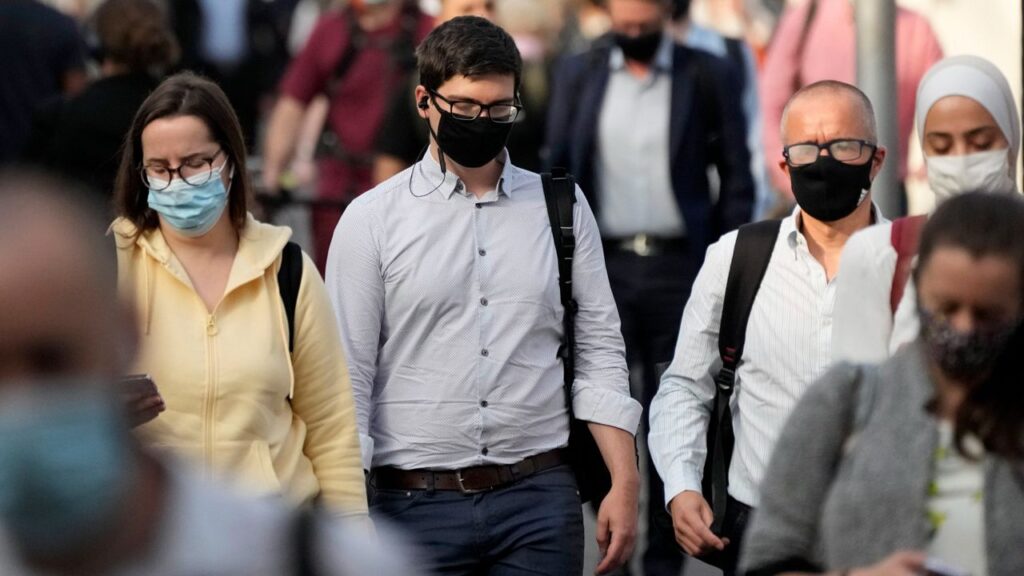Main image courtesy of Spectrum News.
In March of 2020, the coronavirus known as Covid-19 spread across the world. Two years later, we are still feeling its effects. With over 400 million cases and 6 million deaths worldwide, the pandemic reached into every aspect of our lives—from shelter in place orders, masks, to the disruption of the supply chain. Almost everyone knew someone who had it, and some people are still dealing with the repercussions of those who succumbed to the illness.
In addition to affecting our physical health, the Covid-19 pandemic has also taken a toll on our mental and emotional health. While we and our loved ones may have recovered from the illness, the issues affecting our mental health should not be underplayed. Which is why we thought it was important to highlight:
- How Covid-19 has impacted men’s mental health over the course of two years
- Ways you can improve your mental health
How Has Covid-19 Impacted Men’s Mental Health?
In What Ways Have Men Specifically Been Affected By Covid-19?

The Covid-19 pandemic has affected both our mental and physical health. Image courtesy of Slate.com.
The coronavirus swept across the world in a few waves over the past couple of years, making many people very ill. Even after overcoming the disease, some are still affected by the symptoms of “long covid,” which can refer to the continuing recurrence of ongoing health problems due to a Covid-19 infection. In addition to physical symptoms, studies have shown that 18% of individuals diagnosed with covid were later diagnosed with a mental health disorder.
The psychological effects of covid cannot be ignored, and many people, men in particular, are continuing to suffer in silence. When you put that on top of lingering physical symptoms, it is really making an impact. But how has covid affected men’s mental health in particular?
Difficulties Eating And Sleeping
One of the areas that covid is still affecting men even after the physical symptoms have passed is when it comes to eating and sleeping correctly. As we all know, ensuring you’re eating a balanced diet that’s full of a variety of foods is a good way to keep your body at its best. When our body has the nutrients it needs, we can live our best lives. This helps us get done what needs to be done, such as going to work or school. What we consume has an impact on our mood as well, because when your body is operating at its optimum, it really shows in how we interact and relate with others in our lives.
However, the effects of covid can manifest in difficulty eating and ensuring we are getting the proper nutrition. A lot of people reported that they lost their sense of taste after battling through a covid illness, in fact 37% according to one study. This can make it difficult for anyone to want to make sure they’re eating properly if food no longer tastes as it should.
A healthy diet is not only important to maintaining the proper function of our bodies, but it can also have an impact on our sleep cycle. Sleep is just as important as diet and exercise when it comes to keeping our bodies (and immune systems) at peak operating performance. When we’re not eating right, or our eating is disordered, our sleep can suffer as a result.

Many men are having difficulties eating and sleeping due to the pandemic. Image courtesy of Parade.
Difficulties sleeping are also a typical response to stress–stress from learning how the pandemic is still affecting our lives, and economic worries such as the potential for job loss or a reduction in hours.
People are still trying to find their level of normal, and getting back into a comfortable eating and sleeping routine is proving more difficult than we might think. When we’re not eating or sleeping right, it can make an impact on mental health, and lead to an increase in the symptoms of anxiety and depression.
Increased Alcohol Consumption
When our cities and communities closed down due to the pandemic, it left many of us at home and isolated. Without the ability to see friends and family or to go out and enjoy activities, many men turned to alcohol to alleviate boredom or to try and feel less isolated. Alcohol was, and continues to be, a way to help with increased stress levels that are a result of the covid pandemic.
Researchers have found that since the start of the pandemic, alcohol consumption in adults increased by 14%, mostly due to stress at work, or from a recent loss of a job due to the virus. While many people are turning to alcohol to help cope, the after effects of an increase in alcohol consumption are far from helpful. Spikes in feelings of anxiety after drinking are common, and leading to a worsening of mental health.
Increased Stress Levels
Everyone has felt a little more stress in their lives since the pandemic began. This is especially true for those who lost jobs, couldn’t make ends meet, or who are grieving the loss of loved ones from the illness. Prolonged periods of stress and increases in cortisol and the flight/fight response are not good long term for our immune systems.
We can’t expect our body to be capable of fighting off illnesses (including the coronavirus) when our immune systems are down due to stress. Many men are dealing with not only an increase in chronic stress, but finding that it’s also affecting their anxiety levels and state of mental health.
What Can You Do To Improve Your Mental Health?
It’s Not All Gloom And Doom, There Are Ways To Help Improve Your Mental Health!

TMS therapy is one way men have been seeking help for their mental health. Image courtesy of Brain Center TMS.
Although many men are still struggling with their mental health due to the repercussions of the covid pandemic, there is light at the end of the tunnel. If you’re looking for ways to improve your outlook and get the help you deserve, you have options.
TMS Therapy
TMS therapy is an FDA approved way to help treat depression, anxiety, PTSD, and OCD. This type of therapy is non-invasive, and uses magnetic pulses to stimulate the parts of the brain that control mood. Over time, these gentle pulses will help your brain form new neural pathways and connections, which can help alleviate the symptoms of depression and anxiety.
One of the best parts about TMS therapy is that it is an outpatient procedure, which means you can go in for your 20-40 minute session and go on with the rest of your day. There’s no down time, and you can even drive yourself home afterwards. Most patients come in for sessions from anywhere from four to six weeks, and many see long term results when it comes to improvements in the state of their mental health.
Speak With A Therapist
You can also reach out and speak with a mental health professional. Since the pandemic, many therapists have embraced virtual telehealth appointments so you can talk to them from the comfort of your home–making it even easier to get the mental health you need. There are a variety of ways you can start the conversation with a professional:
- Teladoc
- Goodtherapy
- Or search for a therapist in your area that offers virtual/in person sessions
Daily Positive Activities
There is also a lot to be said for the daily practice of meditation, mindfulness, and affirmations. While you cannot control what’s happening in the outside world, you can learn to control your reaction to it. Breathing deeply can help to calm your nervous system when you’re dealing with stress or anxiety, and learning to exist in the present moment can help you see that there are little joys and moments of happiness available to you when you need them.
While the Covid-19 pandemic has affected men’s mental health in a variety of ways, there are options available to you. If you’re struggling with your mental health, consider reaching out and finding a way to get help so you can get back to being your best self.
